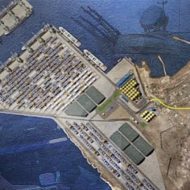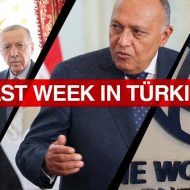By Mehmet Yuva
Syrian President Bashar al-Assad met with members of the Central Committee of the Syrian Ba’ath Party on January 16. Urgent issues of the country, as well as various current global topics, especially Palestine, were discussed in the meeting. A few days after the meeting, by presidential decree, Syria’s National Security Chief (former General Intelligence Director) Ali Mamlouk was appointed as the Head of the Presidential National Security Bureau. His office was replaced by the head of military intelligence, General Kifah Mulhem. Ali Mamlouk was also responsible for the Security Cooperation Agreement (The Adana Agreement) between Türkiye and Syria in 1998. Before 2011, he used to coordinate joint security and intelligence activities with the former head of the Turkish National Intelligence Organization, Emre Taner. Security talks between Türkiye and Syria starting from 2016 were chaired by Hakan Fidan and Ali Mamlouk.
Allegations on the appointments
The change in Ali Mamlouk’s position led to two extreme evaluations: Some believe that he has been demoted to a position where he will be controlled by the President from a position with overarching authority and final decision-making in all intelligence agencies and security matters. On the other hand, some interpret his appointment as he is considered a successor who would govern the country in case anything happens to Assad. Some others attribute this change to the power struggles among Iran, Russia, the US, the UK, the Saudi Dynasty and the United Arab Emirates. There are sources claiming that the appointment was made to win the favor of countries like Saudi Arabia, the UAE and the Western world, as Ali Mamlouk thinks that Syria should be open to relations and collaboration with them rather than being aligned with Iran and Russia.
There are also claims that Ali Mamlouk has preferred Russia to Iran in the power struggle between Iran and Russia over Syria, however, due to the significant sacrifices of Iran in the Syrian war, as well as in Lebanon, Iraq, Palestine and Yemen, Assad has fulfilled Tehran’s expectations and placed Ali Mamlouk in a “passive role” within the center of the government. Some, particularly from the opposition, went further to claim that Ali Mamlouk was killed by Assad and Iran’s decision, his body kept in the morgue, and this will be revealed in a few days. However, these claims refuted by that Ali Mamlouk took office at the People’s Palace (Presidential Palace).
Confirming any of these claims I mentioned is not easy.
Intelligence unit responsible for the economy
The removals of personnel in intelligence units, a profound change in the upper administrative staff with many being interrogated, the dissolution of the ministry responsible for the presidency, the expansion and empowerment of the prime ministry and cabinet’s duties and authorities, the redefinition of the tasks and authority of intelligence units but also the dissolution of the intelligence unit responsible for the economy, and the appointment of General Kemal Hasan, the director of the Palestinian intelligence branch, to the Military Intelligence Directorate all signify the vulnerability of Syrian intelligence units in social, political, security, and economic domains. This also indicates an acknowledgment of the prevalence of corruption, mischief, favoritism, and arbitrariness permeating the system.
Experts and sources we have spoken to said that the primary purpose of the intelligence unit responsible for the economy is to report to the presidency and the prime ministry on illegal economic activities, money laundering, illegal money transfers, external connections of incoming capital investments (especially connections with enemy states), the identities of local and foreign companies and the security procedures of these companies’ owners and key personnel. It is claimed that this unit exploits its influence and authority for illicit activities, such as securing economic interests for personal gain or benefiting close relatives and family members, offering imaginary partners to investors in exchange for security approval and taking a share from those companies’ profits.
Intelligence sharing with Israel
About the current occupation tableau in Syria, there are three serious claims:
The first claim suggests that there is active involvement of intelligence agencies from France, the US, the UK and even Israel among the members of Hayat Tahrir al-Sham and the Turkestan Islamic Party in Idlib.
The second claim is that the US has established numerous military bases to support groups considered “Türkiye’s allies” like the Free Syrian Army and the Syrian National Army in regions controlled by the Turkish Armed Forces.
The third asserts that the YPG/PKK, through their relatives, cells, supporters or person they can buy, shares information with Israel about the activities, residences, and routes used by individuals from Iran, Russia, Lebanon, Palestine, Korea, Latin America, South Africa, and China, who are considered allies of the Syrian state and live in areas controlled by the Syrian government. This information is purportedly used by Israel in planning assassinations and missile attacks.
Identities are noteworthy
Another interesting event was that on January 20th in the Mezze district of Damascus, where a four-store building used by members of the Islamic Revolutionary Guard Corps – Hojjatollah Omidvar, Ali Aghazadeh, Hossein Mohammadi, Saied Karimi, and Mohammad Amin Samadi – was destroyed by four missiles launched from Israel. On December 25th, Sayyed Reza Mousavi was also killed. In previous Israeli attacks of this kind, military and political figures of Hezbollah as well as Syrian officers in Damascus were targeted. Looking at the identities of those detained, arrested, and sought after the attack, it is noteworthy that the individuals associated with the used vehicles in the attacks were Palestinian, Syrian, Jordanian, Lebanese, Iraqi Arab, Kurdish, Turkmen and Assyrian. In operations conducted by the Turkish intelligence organization against individuals affiliated with MOSSAD in Türkiye, detained and arrested individuals were also from Syria, Palestine, Iraq and Iran.
The underlying reasons for the Syrian state’s need to clean up the intelligence apparatus seem to spruce up these institutions and restore the lost professionalism, respect, trust and influence. However, measures taken without eliminating the foreign occupation, economic misery, migration and despair may not yield significant benefits. Changing the current regional landscape that also threatens Türkiye and reviving economic prosperity, security and culture of coexistence among the peoples of the region can only be achieved through cooperation between the states in the region, primarily Türkiye and Syria. After all, mosquitoes cannot be eradicated without draining the swamp.









Leave a Reply